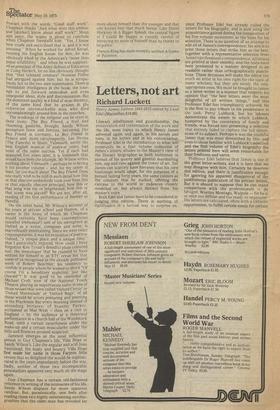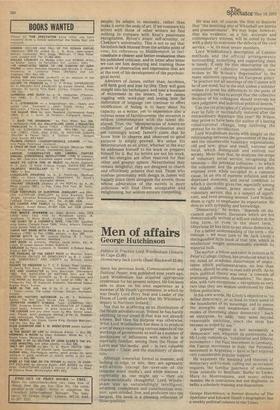Letters, not art
Richard Luckett
Henry James: Letters 1843-1875 edited by Leon Edel (Macmillan £10.00) Literary inheritance and guardianship, the preservation and transmission of the work and the life, were topics to which Henry James adverted again and again, in his novels and tales, in his letters and in his conversation. Professor Edel in the introduction to what will eventually be a four volume collection of James's letters, alludes to the Master's view of the literary biographer as both huntsman in pursuit of his quarry and general marshalling ram, sap and ruse against the tower of art. Yet James can scarcely have foreseen that his own huntsmanwould adopt, for the purposes of a pursuit lasting forty years, the same colours as the creature that he stalked, offering the carcase to the world in cadences closely modelled on, but always distinct from, his master's voice.
Both Edel and James have to be considered in judging this edition. There is nothing of significance in a factual way to surprise us, since Professor Edel has already culled the letters for his biography, and is now using the acquaintance gained during the composition of his five volume monument as the basis for his selection. There is no question of an attempt to edit all of James's correspondence; his aim is to print those letters that strike him as the best, together with a representative selection from James's professional correspondence. All letters are printed in their entirety, and the texts have been presented in a manner designed to .be readable rather than orthographically punctilious. These decisions will make the editor too much an artist in his own right for the taste of many scholars, but they are surely the only appropriate ones. We must be brought to James as a letter-writer in a manner that respects his opinion that "the best letters seem the most delightful of all written things," and this Professor Edel has triumphantly achieved. He is the first to pay tribute to his predecessor in the task, Percy Lubbock, but his labours demonstrate the extent to which Lubbock, hampered by the constraints of family and friends, was forced into presenting a selection that entirely failed to capture the full dimensions of its subject. Perhaps it was the youthful James that was most diminished by this, and even to those familiar with Lubbock's selection and the first volume of Edel's biography the letters printed here will seem remarkable for their freshness and verve.
Professor Edel believes that James is one of the great letter-writers, and it is here that we may disagree with him. Certainly he deserves . this edition, and there is justification enough for ignoring his apparent disapproval of the posthumous publication of his private letters. But it is absurd to suppose that he can stand comparison with the professionals — de Sevigne, Wortley Montagu, Walpole — for he is at once too diffuse and too ready to improvise. His letters are calculated, often with a virtuoso opportunism, to fulfill certain needs for certain
people; he adapts to necessity, rather than make it serve the ends of art. If we compare his letters with those of other writers we find nothing to compare with Keats passionate excogitation, Byron's ironic self-scrutiny, or Chekhov's universality. This is not to say that his letters lack interest from the artistic point of view; his references to Middlemarch in fact consitute a clearer and better evaluation than his published criticism, and in letter after letter we can see him deploying and training those powers of observation and expression that are at the root of his development of the psychological novel.
Admirers of James, rather than Jacobites, will both gain and lose by this. They will gain insight into his techniques, and lose a measure of enjoyment in the letters. To see James juggling with word-play and testing how far elaboration of language can continue to effect modification of feeling is to learn about his capacity as a writer, yet to experience also a curious sense of factitiousness: the occasion is seldom commensurate with the talent displayed. True, the "idiosyncracies of American civilization" (and of British civilisation also) are cunningly noted; James's claim that he knew how to observe and observed to good purpose is amply proved. We sense his determination as an artist, whether in the way he addresses himself to his work or prepares himself for it. But his letters are not his work, and his energies are often reserved for that other and greater .sphere. Nevertheless they remain delightful; they are designed to charm and effortlessly achieve that end. Those who confuse personality with design in James will happily place them alongside the novels; those whose admiration of the novels is more judicious will find them acceptable and enlightening, but seldom entirely compelling.











































 Previous page
Previous page